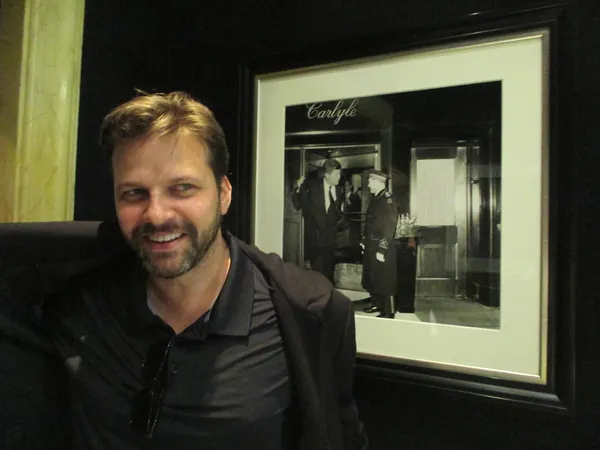 |
| Matthew Miele outside Bemelmans Bar in front of a John F Kennedy photo at The Carlyle Hotel, on Woody Allen: "He used to play at Michael's Pub and now he plays here ..." Photo: Anne-Katrin Titze |
In the closing episode of my conversation with the Always At The Carlyle director Matthew Miele, we discuss preserving the past, Wes Anderson's Hannah And Her Sisters connection to Bobby Short, Bill Murray and Danny of The Carlyle pondering a catch phrase, Jackie O's Cobb salad, the paintings of Jan Weenix, George Clooney and a closet, the sin of enjoyment and Andrew Bolton, and an upcoming project on Alan J Pakula, the director of All The President's Men and Sophie's Choice, and producer of To Kill A Mockingbird.
Anjelica Huston, George Clooney, Rita Wilson, Harrison Ford, Jeff Goldblum, Jon Hamm, Jack Nicholson, Tommy Lee Jones, Alan Cumming, Sofia Coppola, Matthew Weiner, Naomi Campbell, Anthony Bourdain (who died today), Piers Morgan, Fran Lebowitz, Lenny Kravitz, Elaine Stritch, Nina Garcia, Paul Shaffer, Graydon Carter, Vera Wang, Wes Anderson, and Bill Murray all share their fond memories of the historic New York hotel in Always At The Carlyle, shot by Justin Bare (Crazy About Tiffany's, Harry Benson: Shoot First, Scatter My Ashes At Bergdorf's).
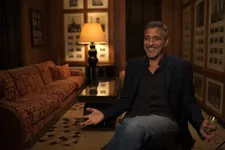 |
| Matthew Miele on getting George Clooney: "What happened was, I had seen him in the hotel a few times." |
Anne-Katrin Titze: Wes Anderson says that the first time he heard of Bobby Short was in Hannah And Her Sisters.
Matthew Miele: That's right.
AKT: For me it was too.
MM: Is that right? Which year did that come out?
AKT: 1986. That scene, I think, for so many people, that's The Carlyle.
MM: Right. Woody [Allen], I guess, because he used to play at Michael's Pub and now he plays here, you have this bridge, I guess, through him from Bobby to Woody. Woody's become a staple now every Monday night. So it's interesting that way. I never got to see Bobby Short live. But I feel that I have because of all the footage we got.
AKT: You do show quite a bit of the performances.
MM: I was questioning if we should do that because a lot of the new performers aren't as iconic. But you kind of want to know what is happening now in the café.
AKT: Now we've got I've Got You Under My Skin playing [Frank Sinatra's version blasts into Bemelmans Bar out of the blue at this point]. "This place is a joke!" We have to talk about that!
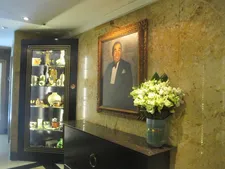 |
| Matthew Miele: "I never got to see Bobby Short live. But I feel that I have because of all the footage we got." Photo: Anne-Katrin Titze |
MM: Who are you talking about? Who said that?
AKT: Right. Who said that? That's a wonderful moment.
MM: It's a good moment because I feel, if that guy came here, that's just so Trumpian to say that! Like, "This place is a joke." You would expect him to say that. But why? Because he doesn't respect … He's in competition, kind of. And he goes against what The Carlyle is. He's all about new and cold and modern, I guess.
AKT: And tacky and suburban?
MM: I didn't say that! But it's true, you're right. And The Carlyle is the opposite. This place represents patina and old world. So he would say it's a joke.
AKT: It's a good joke.
MM (bursts out laughing): It's a very good joke!
AKT: You have these beautiful layers at that moment. You have Danny, the bellman, quote the line. And then you have Bill Murray, putting on his woollen hat. And they are both talking about Trump's comment - possibly.
Because at the very beginning of your documentary, everybody tells you that you won't find out anything about this place. Forget it. You won't learn anything about The Carlyle.
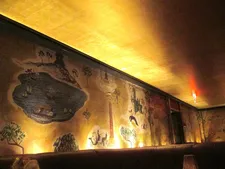 |
| On Ludwig Bemelmans at The Carlyle: "To let an artist come in and paint the walls here! And he stays and then he overstays." Photo: Anne-Katrin Titze |
MM: But do you feel you did find out things?
AKT: No.
MM: What do you mean?
AKT: I'm joking. Of course, we find out plenty.
MM: The New York Times just said they didn't.
AKT: They didn't?
MM: They promised scandal and I didn't deliver it. I went tasteful.
AKT: No, what does that mean, you "went tasteful?" I think you let people expose themselves. There's much more subtlety.
MM: Thank you. And nuance. Than just laying it out there and be like, hey, guess what?
AKT: Yes. And you say, go order Cobb Salad, gin and tonic and a cigarette.
MM: That was Jackie O. That's what she loved. I found that out!
AKT: That's the kind of information. Also that in the lobby, these are Weenix paintings.
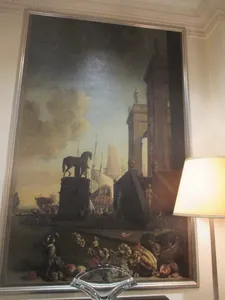 |
| Matthew Miele on the Jan Weenix paintings in The Carlyle lobby: "You sit right next to them!" Photo: Anne-Katrin Titze |
MM: Yes. Not a lot of people would know that because his signature is not there.
AKT: From the 17th Century. They are beautiful. I just looked at them.
MM: Right. You sit right next to them!
AKT: You also learn that Sofia Coppola was a hotel baby.
MM: Some people will say that's the light and airy stuff. I think the critic mentioned it should have been a more serious journalistic study. And I'm like, you go serious here? It's not a serious place, believe it or not. It just isn't. This is a place that's a little off-kilter and unorthodox. And that's the charm of it.
AKT: It's the lightness ... Let me look at my notes for a moment. I'm doing everything here one shouldn't do. First I study the menu forever, now I scan my notes.
MM: No, but I always like that you come prepared because you really thought about the film.
AKT: "History is the essence of innumerable biographies." Who said that?
MM: I like that! Who said that? I don't know.
AKT: Thomas Carlyle!
MM: Oh really?
AKT: This is something I learned. I had no idea that he is the one the hotel is named after.
MM: And happenstance too. Because the daughter was reading it in college and mentioned it at the dinner table. And they were like, yeah, that's a good name. It's crazy to me. It has become iconic now too. All those stories I find fascinating.
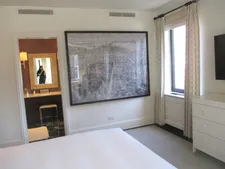 |
| 10th floor suite at The Carlyle Hotel Photo: Anne-Katrin Titze |
AKT: Shall we talk about Itsy Bitsy Spider or George Clooney next?
MM: What do you want to know about George?
AKT: That interview in the closet …
MM: Yeah? He said that!
AKT: Was he happy to talk to you?
MM: What happened was, I had seen him in the hotel a few times. And then I had dinner with him. Dinner across from him.
AKT: That's slightly different.
MM: Yeah. I had a couple of words exchanged but just really niceties. The general manager said "Oh that's the gentleman who is doing the documentary." But that kind of familiarity helped, I guess.
The reason it took four years was because I wanted to build trust from the people and let them know I wasn't just coming in doing a quick fly-by-night documentary. Because unless you immerse yourself, you kind of come away with a gloss without really figuring out why this place matters and what the tongue-in-cheek aspect of it is. Which I found, because they don't take themselves seriously. No one ever did.
To let an artist come in and paint the walls here! And he stays and then he overstays. I'm sure they were complaining about him [Bemelmans]. But ultimately look what he did and look what it's become.
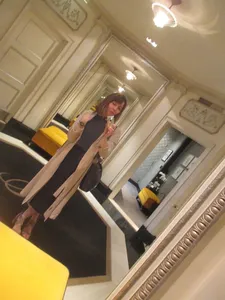 |
| The Carlyle Hotel lobby designed by Dorothy Draper Photo: Anne-Katrin Titze |
AKT: It's impossible to feel sad in here.
MM: And it happened because of someone just saying on a whim "I think there should be a mural on the walls."
AKT: And it really should be protected. These places are going fast.
MM: It's going fast, I know.
AKT: Iconic places here in New York. The Four Seasons restaurant!
MM: I know!
AKT: I talked to the director of Blue Night, Fabien Constant, about that. He did the Carine Roitfeld documentary and for that after party we were at that restaurant. And now, a few years later, we talk about that place. How could they do that?
MM: Just tear it out!
AKT: These are the places with patina and lived life in them. You just have to look at these walls and you feel something.
MM: It's totally true. That's what I kind of value with a film like this is to preserve a past. A lot of people thank me for making it because they can show their kids and show what New York was like.
AKT: You show how the place meant different things to different people. History means things have to change. But you can protect some of it.
MM: Yeah. And I think Dwight [the legendary Carlyle concierge] gets to it when he says he retired because there's a lack of dignity in society now. That's fine society does have to change but I think this place holds on to what was special about certain aspects. I wish there was still smoking in here now.
AKT: You smoke?
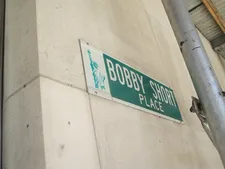 |
| The Carlyle at Bobby Short Place Photo: Anne-Katrin Titze |
MM: I don't. I used to. I wish they had cigarette smoke hanging in these places. There's an allure to it and a romance. It's gross. But it must have had a different feel altogether.
AKT: I'm also an ex-smoker for over ten years.
MM: I'm about ten years right now. But I'm thinking about the Vape. Have you tried that?
AKT: No. No interest. Wouldn't you worry about falling back and sitting there with a cigarette again?
MM: If it's not bad for me, I would do it.
AKT: I love the photograph near the end of your film with the gigantic dog and the little dog and the kid.
MM: Oh, yes, yes, the Irish Wolfhound and the kid. It's almost as big as the kid. And the doorman. That's a photograph that was taken that to me reminds you of what it used to be like. And the innocence of it all. And it's gone. It's really gone.
AKT: There is a playfulness and childlikeness to the place. To come full circle with The Met Costume Institute exhibition we started out with - I asked Andrew Bolton if the new exhibit about the Catholic imagination had to do with the sin of enjoyment.
MM: Oh, really?
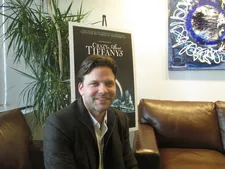 |
| Crazy About Tiffany's, Rosie O'Donnell's painting and Matthew Miele Photo: Anne-Katrin Titze |
AKT: Yeah, using those iconic Catholic robes. And he said, ah, no, maybe, and avoiding that question a bit.
MM: You brought that up to him? The sin of enjoyment! I like that!
AKT: There is the theory that any real fantasy is a fantasy of the sin of enjoyment. Well, Andrew Bolton went in the other direction and said that some of the designers may celebrate that but that for most of them it's nostalgia. Lapsed Catholics, most of the designers are lapsed Catholics and it's the nostalgia for their childhoods. Are you Catholic?
MM: I was. I'm a lapsed Catholic. There's a lot of us. That's so interesting. The sin of enjoyment and he avoided it.
AKT: I mean, it was at the press preview and I'm throwing this at him, so I don't blame him at all for not going into it.
MM: Anyway. Good for you.
AKT: Does this fit for The Carlyle as well? Nostalgia plus a bit of the sin of enjoyment?
MM: Nobody strives for mediocrity. So The Carlyle to me is like it represents one of the finer things in life. And once you aspire and succeed you kind of want that. You want to have somewhere where you could go, where other people who have succeeded have gone and you kind of like feel like wow. This is the trophy in a sense. The suites, where you can stay upstairs. Why work so hard and stay at some mediocre place?
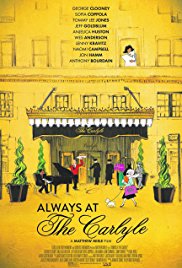 |
| Always At The Carlyle poster |
AKT: But then also at the same time you might discover a great emptiness?
MM: What? No! Not at The Carlyle! That doesn't happen here. I defy you to go to a great suite and find emptiness in yourself.
AKT: I think it's possible. If you don't think you live up to the suite. I think some people might, no?
MM: You have to come in with an air of confidence and know that you've arrived and attained that. I think the people who maybe have come and haven't really felt that they have arrived, that are here under false pretence, might have that. But I don't know. That's a good point. But to me, that's what The Carlyle is.
AKT: Okay. So not here. No emptiness allowed.
MM: Not here. You just have to walk down and you see people sauntering through who are artists or politicians, athletes. There's an energy here that comes off people and exists in the place.
AKT: Is there another film about a New York institution coming?
MM: You know, it's funny because I'm going to focus in on another person, another New Yorker. His name is Alan Pakula. You know, the filmmaker Alan Pakula.
AKT: Of course.
MM: He did Sophie's Choice, All the President's Men, To Kill a Mockingbird. All these amazing movies. I want to focus in on iconic New Yorkers a little bit. He was responsible probably for me getting into film. And I really want to put a spotlight on him. So that's the next one.
As far as any other institutions, I'm doing a little Ladurée thing right now, the macaron place. Which i find pretty fascinating. They're all over the world now. And it all developed from this one little pastry. That goes back like 300 years. I'm kind of curious about that.
AKT: When is Macaron Day?
MM: Is there a day?
AKT: Yes. They hand out free macarons. I stumbled upon it when I was given one in a bakery. Do you remember where I took the last photo of you? A painting.
MM: Rosie O'Donnell's? I remember that.
Read what Matthew Miele had to say on Naomi Campbell, Harrison Ford, Nina Garcia, Anthony Bourdain, Wes Anderson's brother's paintings, Matthew Weiner, and Always at The Carlyle.
Always At The Carlyle is in cinemas across the US.





















